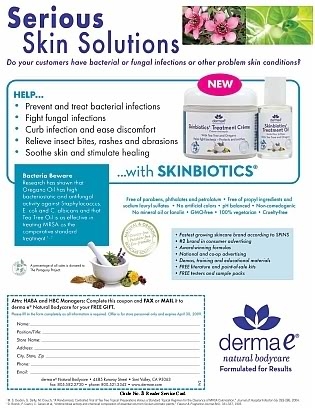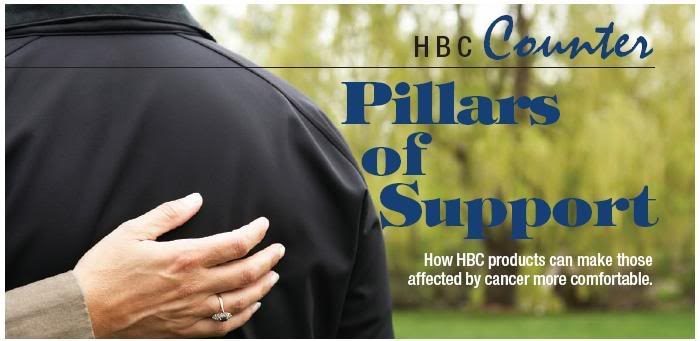Those who choose to fight their cancer with traditional treatments often experience physically and visually uncomfortable changes in the body. According to the American Cancer Society (www.cancer.org), common side effects from such therapies include hair loss, fatigue, sore mouth, gums and throat, and dry and/or discolored skin and nails. Retailers should be sensitive to customers faced with these issues and be prepared to knowledgeably suggest products that will help them look and feel better. Not everyone experiences side effects and they will vary from person to person, but patients should always speak with their doctors about any treatment, side effects and ways of handling them.
Oral Care and Lips
Many patients have dental/oral problems as a result of chemotherapy and radiation. Xerostomia (dry mouth) and gum recession are common. Sufferers can experience bad breath, as well as increased prevalence of cavities and gum disease, mouth sores and cracked, dry lips. In order to combat dry mouth, patients can drink tea to stimulate saliva production. Green tea, chamomile and ginger are great choices. Other options are sugar-free gum or mouthwash containing xylitol, a natural cavity preventer, sweetener and saliva stimulant. Aloe products can be soothing for gum irritations as well as moisturizing. To hurry along the cycle of a mouth sore, patients can use salt water as a mouthwash to draw out fluids and/or bacteria. Keeping lips supple and kissable can be a challenge; lip balms with shea butter, aloe or natural oils like avocado should be used frequently.
Skin and Eyes
Dryness of the skin, eyes and lips is one of the most common effects of cancer treatment. Before anything else, patients should drink plenty of water to hydrate the skin, eyes, lips and mucous membranes.
Skin. Chemotherapy and other treatments can make skin extremely dry, cracked and even peel. Because the skin is the body’s largest organ, it will be most affected by daily habits and products. The artificial fragrances and ingredients in many soaps, body washes, and lotions can be painful when applied to sensitive skin. Turning to natural moisturizing products containing ingredients such as aloe, shea butter, olive oil and avocado might be the only options for patients who need relief.
Eyes. Never put anything in the eyes that wasn’t specifically designed for ophthalmic use. Saline drops can relieve dryness, as well as sleeping with a humidifier to slow evaporation. Although further research is being conducted, there is also “accumulating evidence to suggest that taking essential fatty acid supplements by mouth may improve dry eye symptoms and signs,” for example in flaxseed and fish oil supplements (1). In addition, patients should avoid extreme hot or cold and windy environments to avoid eye irritation, as well as those that are smoky or dusty. It is also important to stay away from products with alcohol, artificial fragrance and wearing too much makeup, if any.
Hair
Nutrition and scalp health are vital to healthy hair, and there are numerous ways to try to combat thinning hair. Supplements and foods with the B vitamin biotin (B7) and the trace mineral silica have been shown to help hair regrowth (2). Shampoos and conditioners containing these ingredients, as well as pantothenic acid (B5) can also be beneficial. There are many brushes on the market with all-natural bristles that are gentle to sensitive scalps and thinning hair and provide scalp stimulation. A daily scalp massage with fingertips and a drop of tea tree oil can help unclog hair follicles and promote growth. When styling hair, harsh brushing and pulling should be avoided, especially tight ponytails or French braids because of tightness and strain on the scalp.
Nails
Chemotherapy drugs, especially those belonging to the taxane group, have been observed to cause extreme nail discoloration and damage (3). Although it might be tempting to go to a nail salon for acrylic nails or silk wraps to cover the damage, the space between the artificial nail and the real nail can create a risky breeding ground for bacteria and infection. Instead, customers can give themselves their own manicure using natural polishes and varnishes to hide discoloration, ridges and lines. However, customers with severe nail damage and cracks should avoid nail polish as it can be irritating. Also, use a non-acetone nail polish remover to avoid irritation and further damage.
Be very careful not to nick the skin while cutting nails with nail-clippers, as any small cut could turn into an infection because of a compromised immune system.
Nails might have become very brittle, so clippers could cause nails to split. Try just filing them instead and using avocado oil to moisture and strengthen them. Other topical solutions include olive oil, lemon peel to clean and whiten, and vitamin E applied directly to cuticles and nails (2). Vitamin E can be used directly from a capsule that has been pricked with a sterilized needle. Also, wear rubber gloves when washing dishes or using household cleansers to avoid extra drying and irritation.
Emotions
A certain amount of emotional upset can be expected before, during and after cancer treatment and emotional health should be recognized as just as important as physical health. In addition to seeking support from family, friends and groups, patients should also find support in their local natural products store. Books that explain relaxation techniques, such as guided imagery, slow rhythmic breathing, yoga and meditation can help to ease negative thoughts and anxiety.
Aromatherapy and candles can be especially helpful, as different scents have been known to positively effect the emotions: For example (4):
* Jasmine: energizing and even an aphrodisiac
* Cedarwood: calming, relieves tension and anxiety and can promote restful sleep
* Lavender: soothing and relaxing
* Lilac: mood uplifting
* Myrrh: helpful for meditation
* Peppermint: reviving and refreshing, increases mental clarity
Some people might enjoy volunteer work or beginning a new hobby or sport as a way to feel stronger and more in control. Others might want to try feeling better by reevaluating and restructuring their nutrition plan. However, anyone who continues to experience emotional distress should speak to their doctor. WF
References
1. The Sjögren’s Syndrome Foundation. www.sjogrens.org/syndrome/dry_eye.html, accessed December 17, 2008.
2. D. Buchman, The Complete Herbal Health Guide to Natural Health and Beauty (Keats Publishing, Inc., New Canaan, CT, 1995).
3. A.M. Minisini, et al., “Taxane-Induced Nail Changes: Incidence, Clinical Presentation and Outcome,” Annals of Oncology. 14, 333–337 (2003).
4. C. Schiller, The Aromatherapy Encyclopedia. (Basic Health Publications Inc., Laguna Beach, CA, 2008).
Published in WholeFoods Magazine, February 2009









